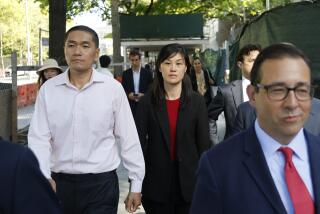Witness Says Huang Told to Stop Raising Funds
- Share via
WASHINGTON — Concerns about the propriety of fund-raiser John Huang’s activities became so pronounced during the 1996 presidential campaign that then-DNC finance chief Richard Sullivan directed Huang to stop arranging fund-raising sessions for the president.
Testifying for a second day at the Senate hearings on fund-raising abuses, Sullivan said Thursday that he and others at the Democratic National Committee became anxious about Huang’s efforts to bring foreigners to private events with President Clinton. Still, Huang continued to raise funds.
Two big-money gatherings in particular caught the attention of investigators: a May 13, 1996, dinner at Washington’s Sheraton-Carlton Hotel that featured California entrepreneur Yogesh K. Gandhi and numerous foreigners prohibited from making contributions in U.S. campaigns and a June 18, 1996, White House coffee that included Democratic donor Pauline Kanchanalak and three Thai business executives that she insisted come along.
Huang himself arranged the two fund-raisers, both of which ultimately proved to be major embarrassments to the Democrats.
Gandhi’s $325,000 contribution--his first-ever political donation--was later returned by the DNC because of suspicions about its origin. At the hearing, senators released wire transfers they said show the donation may have originated in Japan.
Kanchanalak, meanwhile, gave a check for $50,000 to the DNC the day after her White House visit and sent another check for $85,000 a week later. Both checks were later returned by the DNC.
Sullivan testified that he had expressed misgivings to Huang about Kanchanalak bringing overseas guests to the coffee. He said having people who were unable to contribute filling such valuable slots did not help the DNC’s fund-raising effort. Huang, however, pushed the matter.
While Sullivan’s testimony provided a peek inside the DNC’s often sloppy fund-raising shop, he proved a frustrating witness for Republican senators by frequently softening remarks he had made earlier in depositions with investigators.
Throughout his testimony, Sullivan insisted the White House coffees were not fund-raising events. But in his deposition he was a little less sure: “Generally speaking, we did not charge people to come to a coffee. Now, I’m not saying that somebody didn’t . . . say, ‘Well, you know . . . if you make a contribution of $25,000, there’s a good chance that I can get you invited.’ ”
Sullivan was firm during his two days of testimony that he had no indication--and still does not believe--that Huang intentionally collected overseas contributions.
*
“If I had had any indication that John Huang would raise foreign money, I would have walked him into the elevator and walked him out of the building,” Sullivan said.
While much of the testimony has centered on Huang, it is uncertain whether the Glendale resident will ever testify himself. Committee lawyers will meet today with Ty Cobb, Huang’s attorney, to discuss Cobb’s offer of Huang’s testimony in exchange for limited immunity from prosecution. The unusual arrangement has raised questions among members of the Senate Governmental Affairs Committee and is opposed by Atty Gen. Janet Reno.
In another revelation about Huang, Sullivan testified that when Huang went to the DNC in 1995, he was promised a salary bonus by Finance Chairman Marvin Rosen if he brought in significant contributions during the campaign. The DNC turned Huang down. Officials revealed Thursday that Huang in recent months--since the scandal broke--asked for the money.
The bonus, which had not been disclosed previously, would have almost doubled his $60,000 DNC salary to match the $118,000 he had made in his previous position as a deputy assistant secretary at the Department of Commerce.
In the fall, DNC Communications Director Amy Weiss Tobe told The Times that Huang’s agreement with the DNC called for him to receive a salary of $60,000 with no bonuses or incentive clauses. She explained Thursday in an interview that neither the DNC executive director nor the general counsel knew of the bonus promised to Huang until Huang’s attorney pointed it out.
Sullivan said the unusual arrangement was struck between Huang and Rosen. Despite the bonus arrangement, Sullivan said that Huang was so eager to work at the DNC that he might have done it for nothing.
Vice President Al Gore also took some hits in Thursday’s testimony, with Republicans releasing memos raising questions about whether he and his staff knew the April 26, 1996, luncheon held at a Buddhist temple in Hacienda Heights was a fund-raiser.
A memo written by Huang calls the temple event a “fund-raising luncheon,” and a copy of Gore’s schedule that day refers to the amount the attendees would contribute--$1,000 to $5,000 a head.
Democrats, however, released a later version of that schedule--the one Gore says he saw--that merely notes that previous donors would be attending the temple event.
Times staff writer Alan C. Miller contributed to this story.
More to Read
Get the L.A. Times Politics newsletter
Deeply reported insights into legislation, politics and policy from Sacramento, Washington and beyond. In your inbox twice per week.
You may occasionally receive promotional content from the Los Angeles Times.










